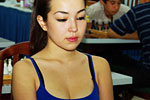


ChessBase 17 - Mega package - Edition 2024
It is the program of choice for anyone who loves the game and wants to know more about it. Start your personal success story with ChessBase and enjoy the game even more.

For the first time in the history of Tashkent, in honour of its landmark anniversary, it played host to the "Mayor's Cup." Chess, like the city of Tashkent, has a long history, so the tournament only seemed fitting. Therefore, from July 16-25, 2009, the strongest chess players of the city and wider, fought for the title in the Poytaht Business Centre. Naturally, intrigue, suspense, and great play were evidenced throughout.
The tournament is officially covered (in Russian) on the official website where there’s a more comprehensive photo gallery, round by round results and tables, and a selection of top games; you can have a relatively readable English engine translation here. This report will, as usual, focus on the less official, social side of the event.

The tournament was held in this beautiful building, the Poytaht Business
Centre, located in central Tashkent

An old photo of the playing venue
The playing venue has a long history. As some know, the word perestroika – literally meaning reconstruction – derives from the Russian root, stroy, meaning to construct or build. Now, here is another word bitterly known to everyone who remembers the Soviet Union from within: dolgostroy – long construction. The word is generally used for large construction projects, which started in the 1980s before the collapse of the USSR, and then stopped due to a lack of funding. The picture above shows what the same building looked like for no less than twenty years, before it was completed recently.

A crowd gathered to watch the festive opening ceremony

Young girls performing a traditional Uzbek dance at the ceremony

A young man, playing the Tar, entertains the crowd
For those unaware, the Tar is a musical instrument claimed by several central
Asian and caucasian nations as their own. Bias granted, Uzbekistan is its official
native home. Visually appealing as well, its body is carved from mulberry, and
its neck from nutwood.

As a truly multicultural city, the opening ceremony also offered this traditional
Polish dance

With the ceremony over, Chief Arbiter Farhad Sabirov delivered an opening
speech
The tournament was a nine-round Swiss, featuring two GMs, in addition to several other titled players, in a field totaling 100 players. As is sure to delight many female readers, WIM Nafisa Muminova, the current Women's Champion of Uzbekistan, went on to beat man after man, including the Men’s Champion of Uzbekistan, IM Jurabek Hamrakulov, with a nice rook sacrifice.

Uzbek Women's Champion, WIM Nafisa Muminova, 2287

Uzbek Men’s Champion, IM Jurabek Hamrakulov, 2517

GM Anton Filippov, 2583
GM Marat Dzhumaev and IM Andrey Kvon jointly finished on 7.5/9. Despite their best efforts, the Uzbek national champions were also denied a shot at taking home the trophy and champion's purse.

Co-champion, GM Marat Dzhumaev, 2535. Hailing from the ancient city of
Samarqand, GM Marat Dzhumaev should simply be Jumaev, just like Kasimjanov.

The other co-winner, IM Andrey Kvon, 2425
Andrey is a local Korean, representative of multicultural life in Tashkent. Uzbekistan has an ethnic Korean population that was forcibly relocated from the Soviet Far East in the 1930s. Everywhere they settled, they established themselves as honest and hardworking people. The older folks still speak their native language, which sounds like a remote dialect of modern South Korea.
The Korean cuisine is very tasty and diverse, though mostly extremely hot. Now, there is one aspect of Korean life that will sound outrageous to most Europeans and westerners in general, but call on your cultural flexibility here: most Koreans here eat dog meat; in fact, they actually keep dog farms. For those outraged, recall the motto of the European Union: "United in diversity."

Pictured at a Kazakh restaurant, having a delicious Kazakh meal of beshbarmak
made of dough and horse meat, are from left to right: Eugene Pak, Champion of
Kazakhstan, GM Anton Filippov, Jamshid Begmatov, Agila Tanirbergenova, and WFM
Guliskhan Nakhbaeva. Both ladies are also from Kazakhstan.

The tournament attracted players of all ages, including this lady,
Emma Tsygankova, an experienced Candidate Master

Gulrooh Begim, just nine, and recent winner of the U10
Uzbekistan Championship with a near perfect 8.5/9

A group of girls in a deep post-mortem analysis
In addition to the main prizes, there were a number of additional titles for which the players contended, including the special titles of Women's Champion and Veteran's Champion. Though hotly contested, clear winners eventually emerged.

Winner of the Women’s top prize, WFM Irina Gevorgian

Another player who contested for the women's title, Shahnoza Sabrinova

Vladimir Klynin, winner of the Veteran’s section.
Of course, the fun at a chess tournament is never strictly confined to the board. In addition to the offering of two simuls, some of the players found time to test their skills in some games of Russian billiards.

On the fourth day of the tournament, an informal Russian billiards tournament
was organized. It is a very interesting game, quite different from American
pool and European snooker. The pockets are just slightly larger than balls,
and scoring is quite a bit of a challenge, as GM Filippov aptly demonstrated
in this losing effort.

In another event, GM Marat Dzhumaev conducted a 16-board simul, drawing
one and winning thirteen

Our old friend Saidali Yuldashev played on 13 boards and scored eight wins with
five draws

Jamshid Begmatov works as a consultant at the European Commission’s Office in Tashkent, Uzbekistan. He also does some chess journalism and TV reporting. After a 10-year break from competitive chess, he decided to participate in the Mayor's Cup, and scored what he considered an embarrassing 3.5/9. Despite his lack of success in the tournament, including his being scalped by WIM Nafisa Muminova, he took his revenge in his game against GM Filippov – in Russian billiards.